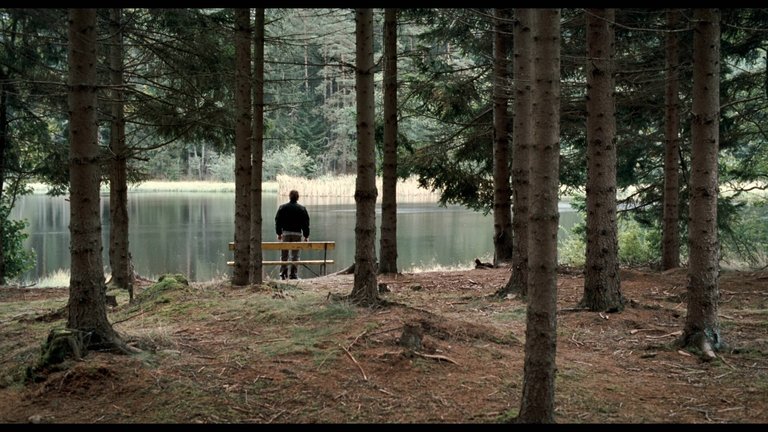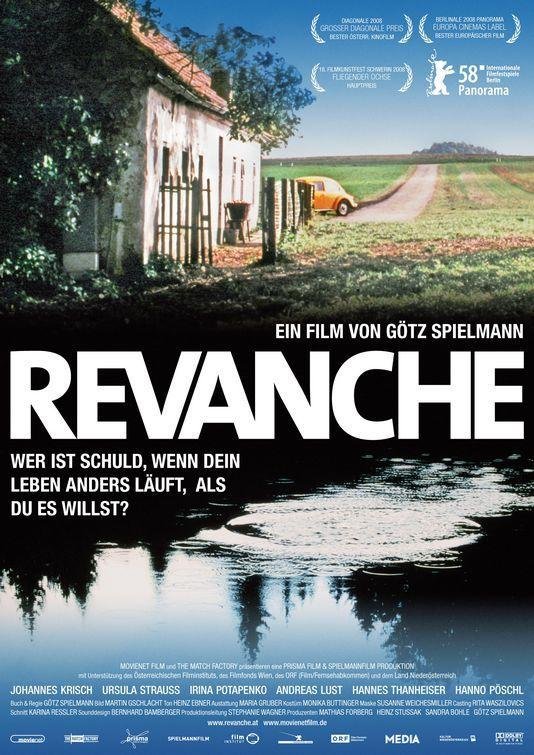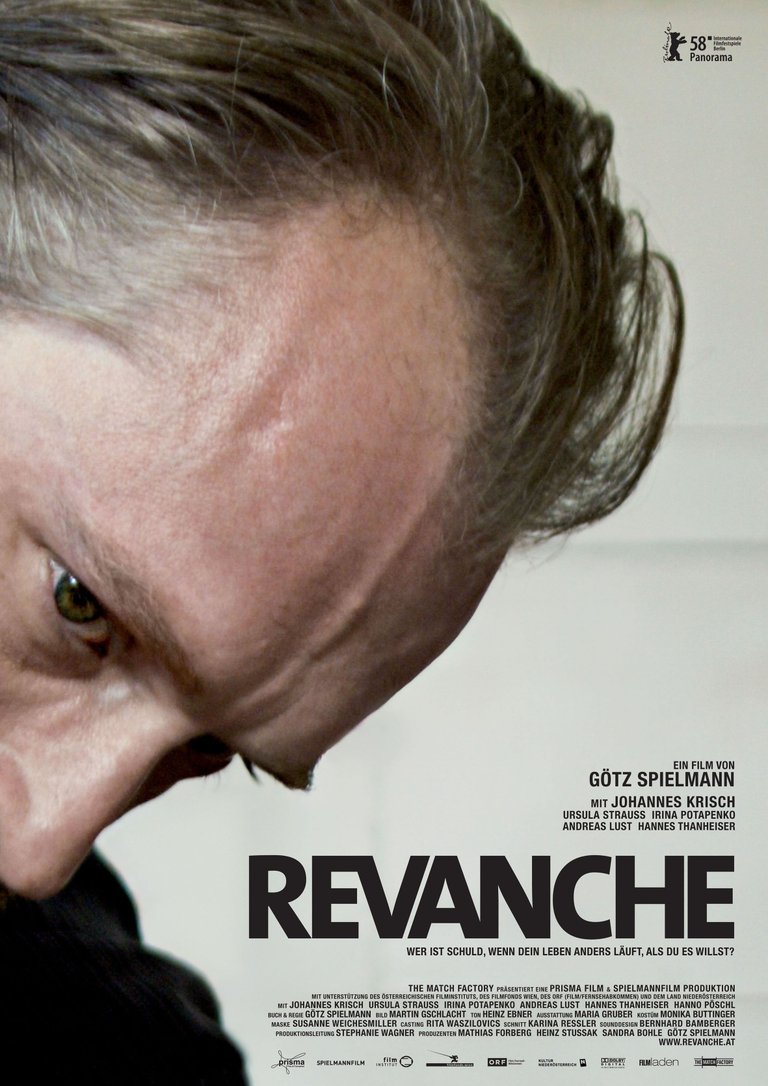Revanche (2008): obsession with revenge | la obsesión por la venganza

Un thriller dramático con mucha carga emocional
A few weeks ago I posted a review of an Austrian film and I mentioned that I didn't remember having seen another film from that country before, so I took on the task of doing a little research and found an Austrian film that was nominated for the Oscar for Best Foreign Film in 2008, which I added to my watch list until I finally saw it a couple of nights ago.
Hace algunas semanas subí la reseña de una película austriaca y mencioné que no recordaba haber visto otra cinta proveniente de ese país anteriormente, así que me di a la tarea de investigar un poco y encontré una película austriaca que fue nominada al Oscar a Mejor Película Extranjera en el año 2008, la cual agregué a mi lista de pendientes hasta que finalmente la vi hace un par de noches.
Written and directed by Götz Spielmann, Revanche is a dramatic thriller that takes place between Vienna and a small rural town on the outskirts. First we see Alex, an ex-convict who works as security personnel in a brothel where Tamara, an undocumented Ukrainian girl, who is emotionally involved with him, secretly from the brothel owner, works. As happens in many of these cases - in the movies and in real life - the owner of the place where Tamara works also owns the apartments in which the girls who prostitute themselves in his business live. Of course, they pay him, but the man takes advantage of this situation to blackmail the girls in various ways. Precisely when the owner of the establishment makes her a compromising proposal, Alex proposes to Tamara that they escape, that they flee from the brothel to finally be free, only of course, they need money. Tamara must remain hidden, she has no documents, so there is not much she can do; and Alex, being what he is, only comes up with one not-so-bright idea: rob a bank. Not a big bank in Vienna, but a small bank on the outskirts, in a rural area where Alex's grandfather also lives and as a Latin American saying goes to refer to the consequences of living in a small town: "small town, big hell".
Escrita y dirigida por Götz Spielmann, Revanche es un thriller dramático que transcurre entre Viena y una pequeña ciudad rural en las afueras. Primero vemos a Alex, un exconvicto que trabaja como personal de seguridad en un prostíbulo en el cual trabaja Tamara, una chica ucraniana, indocumentada, que está involucrada emocionalmente con él, a escondidas del propietario del prostíbulo. Como ocurre en muchos de estos casos - en las películas y en la vida real - el dueño del lugar en el que trabaja Tamara también es dueño de los departamentos en los cuales viven las chicas que se prostituyen en su negocio. Por supuesto, ellas le pagan a él, pero el hombre se aprovecha de esa situación para chantajear a las chicas de diversas maneras. Precisamente cuando el dueño del local le hace una propuesta comprometedora, Alex le propone a Tamara que escapen, que huyan del prostíbulo para ser finalmente libres, sólo que como es lógico, necesitan dinero. Tamara debe permanecer oculta, no tiene documentos, así que no es mucho lo que puede hacer; y a Alex, siendo lo que es, sólo se le ocurre una idea no muy brillante: robar un banco. No un gran banco en Viena, sino un pequeño banco en las afueras, en una zona campestre en donde además vive el abuelo del propio Alex y como dice un dicho latinoamericano para referirse a las consecuencias de vivir en una población pequeña: "pueblo pequeño, infierno grande".

Without anticipating too much, I will just say that the robbery goes wrong and although Alex manages to escape to hide in his grandfather's house, his enemies are very close, which generates a climate of great tension because we don't know how long the ex-convict will be able to escape of a new imprisonment. Added to this is the personal drama of Alex, his grandfather and a couple of neighbors who will be key in the development of the story.
Sin anticipar mucho, sólo diré que el atraco sale mal y aunque Alex logra escapar para esconderse en la casa de su abuelo, sus enemigos están muy cerca, lo que genera un clima de gran tensión porque no sabemos durante cuánto tiempo podrá el ex convicto escapar de un nuevo encarcelamiento. A ello se suma el drama personal de Alex, de su abuelo y de una pareja de vecinos que serán claves en el desarrollo de la historia.
As the title suggests, Revanche is one of those stories with a vengeful obsession in the middle, but the funny thing is that if you look a little deeper, it turns out that it's not just one person who wants revenge. In the first instance, both Alex and Tamara would like to do something against the brothel owner for the way he manipulates and enslaves his workers; Then, Alex wants revenge for what happened to Tamara during the assault, but since they are the criminals, it's obvious that justice seeks to avenge the citizens by arresting the guilty; And to that are added two other personal vendettas that merge into one in which jealousy, pain, the past, guilt and resentment are mixed. On the other hand, there is an interesting topic from a social, legal and institutional point of view: a police officer mortally wounds a criminal after committing a crime and instead of being recognized as a hero - which happens in most films from Hollywood - the police officer is investigated, which further increases the anguish he already felt for having killed a human being. Although I think glorifying him for having killed someone would be exaggerating, where is the right measure to react to an event like this? If criminals can shoot and injure police forces, but when the bullets travel in the opposite direction the shooter is judged more harshly, is there anyone who wants to risk their life for the good of others knowing that it could cost them their job?
Como lo sugiere el título, Revanche es una de esas historias con una obsesión vengativa en medio, pero lo curioso es que si se analiza un poco más, resulta que no es una sola persona la que quiere vengarse. En primera instancia, tanto a Alex como a Tamara les gustaría hacer algo en contra del dueño del prostíbulo por la forma en que manipula y esclaviza a sus trabajadoras; luego, Alex quiere vengarse de lo que le ocurrió a Tamara durante el asalto, pero siendo ellos los criminales, es obvio que la justicia busque vengar a la ciudadanía arrestando a los culpables; y a eso se suman otras dos venganzas personales que se funden en una sola en la que se mezclan los celos, el dolor, el pasado, la culpa y el rencor. Por otro lado, hay un tema interesante desde el punto de vista social, legal e institucional: un policía hiere mortalmente a un criminal luego de cometer un delito y en lugar de ser reconocido como un héroe - lo que sucede en la mayoría de las películas de Hollywood - el policía es investigado, lo que aumenta aún más la angustia que ya sentía por haber matado a un ser humano. Si bien glorificarlo por haber matado a alguien creo que sería exagerar, ¿en dónde está la medida justa para reaccionar ante un hecho como este? Si los criminales pueden disparar y herir a los cuerpos policiales, pero cuando las balas viajan en sentido contrario se juzga más duramente a quien las dispara, ¿habrá alguien que quiera arriesgar su vida por el bien de los demás sabiendo que eso le puede costar su trabajo?

There are many reflections that can be made from various topics, so it is a genius that Götz Spielmann has achieved it with a handful of characters. Considering the main and secondary characters we have five or six characters and so many things emerge from the different relationships between them: fatherhood, frustrations, mental health, the margin of the law, abuse, impunity, marriage, love, forgiveness, redemption and many others things.
Son muchas las reflexiones que se pueden hacer a partir de diversos temas, por lo que es una genialidad que Götz Spielmann lo haya logrado con un puñado de personajes. Considerando los principales y los secundarios tenemos cinco o seis personajes y de las diferentes relaciones entre ellos se desprenden tantas cosas: paternidad, frustraciones, salud mental, el margen de la ley, abusos, impunidad, matrimonio, amor, perdón, redención y muchas otras cosas.
But, as expected, the central theme is the obsession with revenge. When someone does something to us and the desire to take revenge arises in us, what do we really want? Do we want the same thing to happen to others? That is, is it a matter of symmetry, of karma? Or what we want is for that other person to suffer the guilt of having hurt us? And if you suffer from it, is it enough for us? Is it possible to forgive someone who has hurt us? What would it take for us to forgive him? And if the situation were reversed and we had hurt another, would we still support their right to get revenge? The issue with revenge is that, by executing it, it sows the seed for a new revenge in the opposite direction and thus it is impossible to stop this maelstrom of violence and hatred. Unless something happens like what happens in Revanche (although in reality a lot of things happen) and which, in my opinion, is the best ending the movie could have. Due to impeccable performances, remarkable direction, reliable photography, but above all a wonderful script, I think Revanche is a great option for those who want to see a good thriller that, touching common places, also surprises us with a different proposal, have any of you seen this movie? I read you in the comments.
Pero, como era de esperarse, el tema central es la obsesión con la venganza. Cuando alguien nos hace algo y surge en nosotros el deseo de vengarnos, ¿qué es realmente lo que deseamos? ¿queremos que al otro le ocurra lo mismo? Es decir, ¿es un tema de simetría, de karma? ¿o lo que queremos es que ese otro sufra la culpa de habernos hecho daño? Y en caso de que la padezca, ¿nos basta? ¿es posible perdonar a quien nos ha hecho daño? ¿qué se necesitaría para que le perdonemos? Y si la situación fuese al revés y nosotros hubiéramos lastimado a otro, ¿seguiríamos apoyando su derecho a vengarse? El tema con la venganza es que al ejecutarla siembra la semilla para una nueva venganza en sentido contrario y así es imposible detener esa vorágine de violencia y odio. A menos que suceda algo como lo que ocurre en Revanche (aunque en realidad ocurren muchísimas cosas) y que, en mi opinión, es el mejor final que podía tener la película. Por unas intachables actuaciones, una dirección destacable, una fotografía cumplidora, pero sobre todo un maravilloso guión, creo que Revanche es una gran opción para quienes quieran ver un buen thriller que tocando lugares comunes también nos sorprenda con una propuesta diferente, ¿alguno de ustedes ha visto esta película? Los leo en los comentarios.
Reseñado por @cristiancaicedo
Other posts that may interest you | Otros posts que pueden interesarte:
 |
|---|



